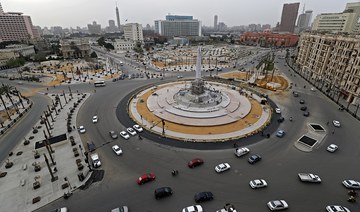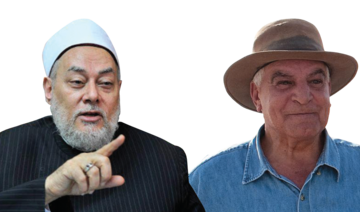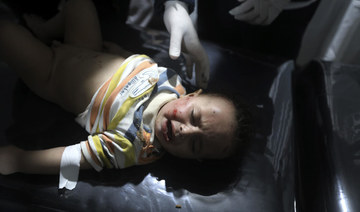CAIRO: In a bustling square of Egypt’s capital, four sphinx-like statues stand in wooden crates ahead of a planned unveiling ceremony following their controversial transfer from historical sites.
With the bodies of lions and heads of rams, the statues had for millennia graced Karnak temple in the southern city of Luxor representing the ancient Egyptian god “Amun.”
This month, the restored sandstone statues were moved to Cairo’s landmark Tahrir Square, the epicenter of a 2011 popular uprising that toppled longtime ruler Hosni Mubarak.
“I am against the moving of Luxor monuments. I was especially saddened by their relocation,” legislator Ahmed Idris from the city told AFP.
“Luxor has long been like an open museum which should be developed and its monuments’ historical value are tied to the city,” said Idris.
The statues will be the square’s centerpieces, along with a 19-meter-tall (60-foot-tall) pink granite obelisk of the famed Ramses II.
The 3,000-year-old obelisk — of Ramses II facing an ancient deity as well as inscriptions of his titles — was moved from a Nile Delta archaeological site.
The relocations which came as part of government plans to renovate Tahrir Square have drawn wide criticism from archaeologists and activists.
Some petitioned President Abdel Fattah El-Sisi to stop the transfer.
Others including lawyers from a rights group filed a lawsuit citing a 1964 Venice Charter on the conservation and restoration of monuments, saying the move could “jeopardize the priceless artefacts.”
Egypt signed the charter, adopted by UNESCO, in 1974.
A frenetically busy square, Tahrir in downtown Cairo has long been associated with blaring car horns, traffic jams and exhaust fumes.
It stands a short stroll away from the Egyptian Museum, a tourist magnet which holds a vast collection of precious relics.
A staging ground for major protests in Egypt, the square has undergone multiple phases of renovation since the 2011 uprising.
Its renovation plan includes unifying building facades, removing street advertisements and an overhaul of its lighting.
In December, El-Sisi said the transfer of artefacts would add “a touch of civilization” to the site.
But fears have grown over possible damage to the monuments.
“The high pollution in Tahrir Square will ruin the antiquities and accelerate their deterioration,” Egyptologist Monica Hanna said in a Facebook post in December.
“A monument’s value is diminished when removed from its original historical context and becomes an ornament rather than a monument,” she said.
Egyptian architect Ayman Badr has said the square does not need “to be adorned with historical elements” as it “already holds historical value.”
Antiquities and Tourism Minister Khaled Al-Anani has dismissed warnings that the monuments could be vandalized or be affected by pollution.
Ancient relics in Egyptian museums or public spaces often suffer damage by graffiti, engravings or just being frequently touched.
“No-one will be able to touch them. They will be placed on a high pedestal and surrounded by a water fountain,” Anani told a private television channel in March.
He said they would undergo regular restoration and maintenance.
The statues were not among those lined up on the famed Kebash (rams) avenue linking Karnak and Luxor temples, according to the minister.
Mahmoud Zaki, a tour guide from Luxor, also sided with those defending the transfers.
“We exhibit artefacts abroad for foreigners to enjoy... and now it’s a great honor that antiquities from Karnak temple adorn Egypt’s most popular square,” he told AFP.
An unveiling ceremony is planned but an official date has yet to be announced.
“It’s nonsensical that (Egyptian) obelisks could be found in public spaces across the world and none of them stands in Egypt’s most popular square,” said antiquities expert Ali Abu Deshish.
Transfer of sphinxes to Cairo square stirs controversy
https://arab.news/6x67r
Transfer of sphinxes to Cairo square stirs controversy
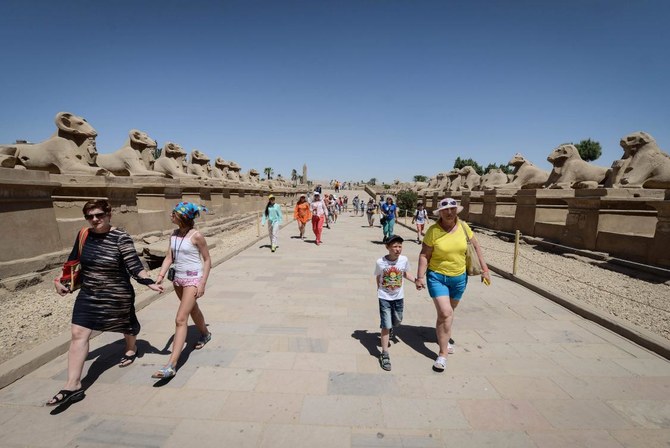
UK announces sanctions targeting Iranian defense sector
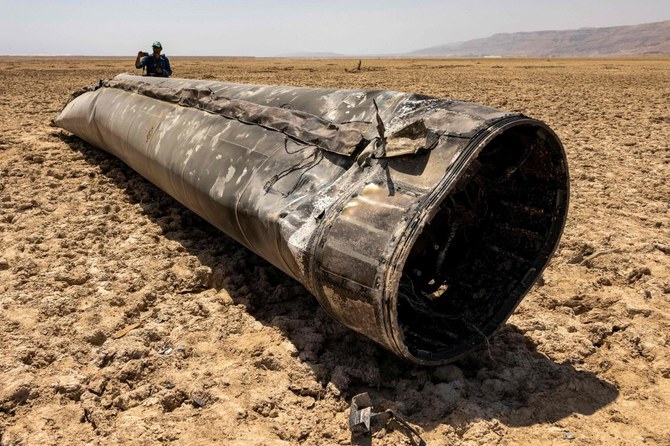
LONDON: Britain on Thursday announced new sanctions targeting Iranian individuals and businesses in the country’s defense sector for involvement in what it said was “hostile activity” by the Iranian government.
Britain had added six designations under its Iranian sanctions regime, an official notice showed.
Egypt, Dutch leaders discuss Gaza ceasefire efforts

- Rafah assault ‘will have catastrophic consequences on regional peace and security,’ El-Sisi warns
- Egypt’s president and the Dutch prime minister agreed on the urgency of working toward reaching a ceasefire
CAIRO: Egypt’s President Abdel Fattah El-Sisi has discussed efforts to reach a ceasefire in Gaza with Mark Rutte, prime minister of the Netherlands.
During a phone call from Rutte on Thursday, the Egyptian leader warned that any Israeli assault on Rafah will have “catastrophic consequences” for the humanitarian situation in the enclave.
The leaders discussed bilateral relations, and ways to enhance cooperation across various political and economic levels consistent with the current momentum in Egyptian-European relations.
Ahmed Fahmy, presidential spokesman, said the call also focused on the situation in Gaza, and Egypt’s efforts to restore regional stability by reaching a ceasefire and providing access to humanitarian aid.
El-Sisi reiterated the crucial importance of ending the war, warning against any military operations in the Palestinian city of Rafah, which will have catastrophic consequences on the humanitarian situation in the strip and on regional peace and security.
The Egyptian leader underscored the need for the international community to assume its responsibilities to implement the relevant UN resolutions.
Egypt’s president and the Dutch prime minister agreed on the urgency of working toward reaching a ceasefire, and ensuring the flow of adequate humanitarian aid to all areas of the Gaza Strip in order to protect it from a humanitarian catastrophe.
They also emphasized the need to move toward implementing the two-state solution, which would restore regional stability, and establish security and peace in the region.
In March, El-Sisi received Rutte to discuss bilateral relations, regional developments, and Egypt’s efforts to reach a ceasefire and offer humanitarian assistance in Gaza.
Lebanon postpones local elections again as violence rocks south

- Lebanon is supposed to hold municipal elections every six years
- Parliament approved “extending the existing municipal and elective councils’ mandate until a date no later than May 31, 2025,” despite objections from lawmakers opposed to Hezbollah
BEIRUT: Lebanon’s parliament on Thursday delayed municipal elections for a third time in two years, state media reported, as militants in the country’s south exchanged near-daily fire with Israel for over six months.
The powerful Iran-backed Hezbollah group has been trading fire with Israeli forces across the border since the day after its Palestinian ally Hamas carried out a deadly attack on Israel on October 7, triggering the ongoing war in the Gaza Strip.
Lebanon is supposed to hold municipal elections every six years, but cash-strapped authorities last held a local ballot in 2016.
Parliament approved “extending the existing municipal and elective councils’ mandate until a date no later than May 31, 2025,” despite objections from lawmakers opposed to Hezbollah, said the official National News Agency.
The bill cited “complex security, military and political circumstances following the Israeli aggression on Lebanon” and especially its south, near the border, as reasons for the delay.
Lawmakers did not set a new date for the elections, initially scheduled for 2022.
Local councils help provide basic services to residents, but their role has declined as state coffers ran dry after Lebanon’s economy collapsed in late 2019.
Parliament Speaker Nabih Berri had previously said southern Lebanon could not be excluded from any upcoming ballot, after the Christian Lebanese Forces, the main party opposing Hezbollah, insisted on holding the polls on time.
More than 92,000 people have been displaced from their homes in Lebanon due to the violence, as have tens of thousands of residents of Israeli communities across the border.
Since violence began along the Israeli border on October 8, at least 380 people have been killed in Lebanon, including 72 civilians, according to an AFP tally.
Israel says 11 soldiers and eight civilians have been killed on its side of the border.
In April 2023, the Lebanese parliament had already postponed municipal elections as the deputy speaker warned holding them was “almost impossible” for the cash-strapped country after years of economic meltdown.
Lebanon has faced the prolonged financial crisis and months of border clashes essentially leaderless, without a president and headed by a caretaker government with limited powers amid deadlock between entrenched political barons.
Palestinian officials say Israeli forces kill teen in West Bank
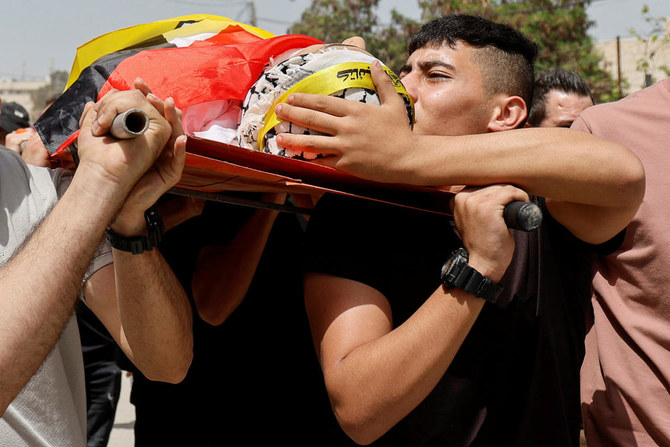
- Israeli police said “hits were identified” when forces responded to stone-throwing with gunfire
- The Palestinian health ministry said Khaled Raed Arouq was shot in the chest and “martyred by the occupation’s live bullets“
RAMALLAH, Palestinian Territories: Palestinian officials said Israeli forces killed a 16-year-old boy during a raid in the West Bank city of Ramallah early on Thursday.
Israeli police said “hits were identified” when forces responded to stone-throwing with gunfire but did not directly address the allegation.
The Palestinian health ministry said Khaled Raed Arouq was shot in the chest and “martyred by the occupation’s live bullets.”
Palestinian official news agency Wafa said Arouq died after being “shot by Israeli gunfire” early on Thursday morning.
Israeli forces carry out regular raids on towns and cities in the occupied West Bank and violence has soared in the Palestinian territory since the war in Gaza broke out on October 7.
Wafa said Israeli military vehicles stormed the city and “confrontations broke out between citizens and the occupation forces, who fired live bullets and stun grenades.”
It said Israeli forces were stationed in several neighborhoods and raided a house in Al-Bireh to the northeast.
Israeli police said: “Terrorists threw stones at the forces operating in the area, the forces responded with gunfire, and hits were identified.”
The police said they made several arrests and that Israeli forces did not suffer any casualties.
The army did not immediately respond to AFP’s request for comment.
Later on, Thursday, mourners carried Arouq’s body wrapped in the flag of Fatah, the political party of Palestinian president Mahmud Abbas, in his hometown of Jenin where he was buried.
“He was hit by a bullet in his back, which exited through his chest...They assassinated him in cold blood,” Majed Arqawi, cousin of Arouq, told AFP.
Wafa said Arouq’s father was an officer in the Palestinian military intelligence service.
Israel has occupied the West Bank since 1967 and at least 488 Palestinians have been killed by Israeli troops or settlers there since October 7, according to Palestinian officials.
At least 19 Israelis have been killed in attacks by Palestinians in the same period, according to official Israeli figures.
Hezbollah denies Israel claim it killed half of commanders in south
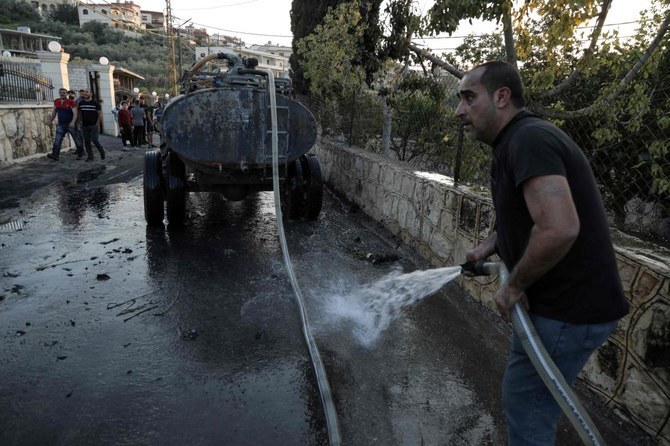
- The number of slain Hezbollah members who “hold a certain level of responsibility does not exceed the number of fingers on one hand“
- Gallant’s claim was “untrue and baseless”
BEIRUT: Hezbollah denied on Thursday an Israeli claim that it had killed half of the Iran-backed Lebanese group’s commanders in the south of the country, saying only a handful were slain.
The Lebanese group has been exchanging near-daily fire with the Israeli army since the day after its Palestinian ally Hamas carried out an unprecedented attack on Israel on October 7.
Israel’s Defense Minister Yoav Gallant said on Wednesday that “half of Hezbollah’s commanders in southern Lebanon have been eliminated” in the months of cross-border violence sparked by the Israel-Hamas war in Gaza.
“The other half are in hiding and abandoning the field to IDF (Israeli army) operations,” he added, without specifying how many.
A Hezbollah source who spoke on condition of anonymity rejected the claim.
The source told AFP that the number of slain Hezbollah members who “hold a certain level of responsibility does not exceed the number of fingers on one hand.”
The source said Gallant’s claim was “untrue and baseless” and designed to “raise the morale of the collapsed (Israeli) army.”
Israel has frequently claimed to have killed local Hezbollah commanders in targeted strikes, but the group has only confirmed a few were high-level members, referring to the rest as fighters in their statements.
Since October 8, the day after the Hamas attack on southern Israel, at least 380 people have been killed in Lebanon, including 252 Hezbollah fighters and dozens of civilians, according to an AFP tally.
Israel says 11 soldiers and eight civilians have been killed on its side of the border.
Tens of thousands of people have been displaced on both sides.
Both sides have stepped up attacks this week, with Hezbollah increasing rocket fire on military bases, while Gallant said in his latest remarks the army had carried out “offensive action” across southern Lebanon.
The Israeli military also said on Wednesday that it had struck 40 Hezbollah targets in Lebanon’s south.
Hezbollah leader Hassan Nasrallah has said his group had some 100,000 “trained” and “armed” fighters, but analysts say this number is likely inflated.



